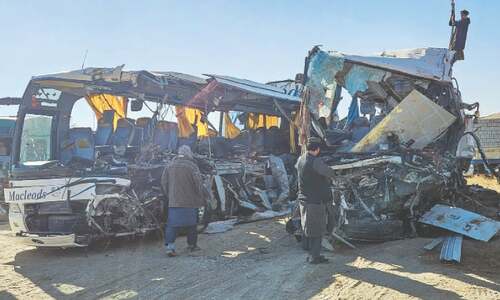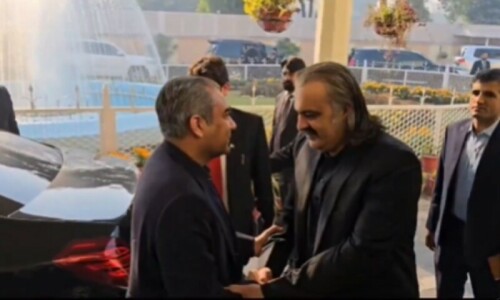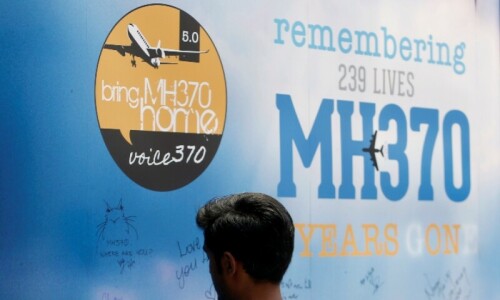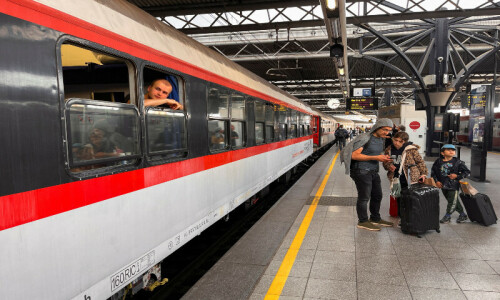JERUSALEM: US Secretary of State John Kerry insisted on Thursday Israel’s security is a top priority for Washington, both in nuclear talks with Iran and peace talks with the Palestinians.
Kerry is in Israel for a day of talks with Israeli and Palestinian leaders aimed at driving forward peace negotiations which appear to have made little headway since they began under his patronage in late July.
But Iran was also high on the agenda when he met for more than three hours with Prime Minister Benjamin Netanyahu in what was their first face-to-face meeting since a fallout over the nuclear deal struck with Iran.
“I can’t emphasise enough that Israel’s security in this negotiation (with Iran) is at the top of our agenda,” Kerry said at a joint news conference in Jerusalem.
“The United States will do everything in our power to make certain that Iran’s nuclear programme of weaponisation possibilities is terminated.” Kerry also stressed the two men had spent “a very significant amount of time” discussing the peace talks with the Palestinians. “Israel’s security is fundamental to those negotiations,” he said.
In the morning, Netanyahu was briefed by US special envoy on security General John Allen, Kerry said, describing his role as that of “assessing the potential threats to Israel, to the region, and ensuring that the security arrangements that we might contemplate in the context of this process, will provide for greater security for Israel”.
Kerry said he and Allen had offered Netanyahu “some thoughts about that particular security challenge” in a discussion which would be continued during an evening dinner meeting, and possibly into Friday morning.
US and Israeli media reports have suggested that Allen was to present Netanyahu with an outline of how Israel’s security arrangements might look as part of a peace deal.
A State Department official said that the American update would include “many details and specifics” but denied Allen was to present Netanyahu with a ready-made plan.
“This is obviously an ongoing discussion about Israel’s security... it’s not to present a plan,” he said.
Netanyahu also alluded to discussion of security issues, saying that in any peace agreement, Israel “must be able to defend itself, by itself, with our own forces” – an allusion to the reported debate over security in the Jordan Valley which runs down the eastern flank of the West Bank.
Israel has always insisted that in any final agreement, it would have to maintain a military presence in the Valley, and has rejected outright the idea of any third party involvement.
According to a report in Maariv newspaper, Allen was to have outlined a “bridging proposal” which will enable Israel to reduce, as much as possible, its military presence in the Jordan Valley.
But deputy defence minister Danny Danon insisted Israel would not compromise on security in the Valley and “not outsource its basic security needs to the Palestinians”.
And he said the Jewish state would not be pressurised by the Americans into accepting another “bad deal” – a reference to the first-stage deal struck with Iran in Geneva last month.
“After the debacle in Geneva, we will not allow Secretary Kerry to pressure us into another bad deal. We have been down this road before,” he said in a statement, referring to the barrage of rocket fire which followed Israel’s 2005 withdrawal from the Gaza Strip.
“We will never compromise on our security, even if it means saying no to our closest ally,” he added.
Following talks with Netanyahu, Kerry headed straight to Ramallah to meet Palestinian president Mahmud Abbas for discussions also expected to focus on security, although Israeli settlement construction was expected to be high on the agenda.
With the talks almost at the half-way point, the Palestinians have warned that if the negotiations fail, they would revive efforts to seek international recognition, which have currently been frozen.
“The talks are going through great difficulties because of the obstacles created by Israel,” Abbas said on Monday, referring to Israel’s ongoing push to increase settlement.—AFP













































Dear visitor, the comments section is undergoing an overhaul and will return soon.